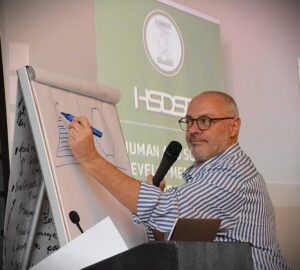Silence Charumbira
Sudan is in the throes of a devastating cholera outbreak that has claimed thousands of lives in just a few months, with children bearing a grave share of the suffering. As of early this month, Khartoum State alone had recorded more than 22,380 of the over 80,000 total cases—1,665 of which involve children under five, according to Dr Bashir Kamal Eldin, Save the Children‘s Health and Nutrition Director.
Across Sudan, children account for 21% of cholera admissions, highlighting a crisis that is swiftly turning into a catastrophe for the youngest and most vulnerable, he says.
The rapid spread of the disease is propelled by relentless conflict, the collapse of critical infrastructure, contamination of water sources, poor sanitation, and dangerously overcrowded shelters. Hospitals and health clinics—many already damaged or inaccessible—are stretched to the brink, battling not just cholera but a fatal combination of malnutrition, trauma, and preventable diseases. Despite these conditions, recent interventions have cut the fatality rate of treated cholera cases from 5.7% to 1.6%, proving that response efforts save lives when resources reach those in need.
“Save the Children, in partnership with Alight, the International Medical Corps, is at the forefront of a coordinated response to address the multiple crises affecting Sudan. Our interventions include cholera treatment and case management at specialized treatment centres to provide life-saving care. We have also expanded immunization programs to protect children against vaccine-preventable diseases, especially important given the widespread disruption to health services,” Eldin says.
The organisation is implementing WASH interventions, such as expanding water pipelines, constructing latrines, and running hygiene promotion campaigns to reduce disease transmission. Nutrition screening and treatment programmes are in place to combat malnutrition and prevent starvation, while protection and psychosocial support services focus on vulnerable groups affected by the conflict.
He says their efforts are closely coordinated through national and state health and humanitarian clusters to ensure alignment with government and UN agencies, maximising impact and avoiding duplication.
“However, funding remains a major challenge. Only 16 percent of the $50 million needed for the cholera response has been secured, and the overall humanitarian appeal for Sudan is just 13.5 percent funded. This critical shortfall puts supplies and services at risk, threatening to undermine the response at a time when the needs are urgent and growing.”
On the frontlines, Save the Children is collaborating with Alight, and International Medical Corps coordinate life-saving interventions that include cholera treatment and specialised case management, expanded immunisation programmes to shield children from vaccine-preventable diseases.
There is urgent need for scaling up funding and humanitarian access with 5 million Sudanese women and children at the risk of famine.
“Malnutrition is worsening every day, and the risk of famine is very real. This is tragically pushing more children to the brink, with child mortality rising as a direct result.
“The health system is stretched to breaking point, and insecurity means vaccination campaigns can’t reach the children who need them most — leaving them vulnerable to preventable diseases. On top of that, children and women are facing escalating psychosocial trauma and protection risks due to ongoing conflict and displacement. In short, the future looks very bleak for millions of vulnerable children and families unless there is an immediate and substantial scale-up of humanitarian support to protect their lives and wellbeing,” Eldin says.
He says over 16 million children in Sudan are in urgent need of humanitarian assistance owing to an array of factors including ongoing conflict, widespread displacement, and escalating health crises. And it is children under five are particularly vulnerable to cholera.
More from Africa News 24
UN Special Representative urges swift action to advance peace in South Sudan
“Malnutrition is another critical issue, nearly five million children and mothers are suffering from acute malnutrition, and tragically, over 637,000 people are already living in dire conditions. Protection risks are also alarmingly high, especially for girls in conflict-affected areas like Kordofan, where between 70 to 80 percent report experiencing violence.”
Ready-to-Use Therapeutic Food (RUTF) stocks are running critically low threat Food, which is essential for treating children with severe malnutrition.
“Without these lifesaving supplies, many of these children won’t survive. We and our partners have urgently called for more funding and support to keep these nutrition programs running, but the needs are overwhelming.
With families facing extreme hunger, coping mechanisms like child marriage are becoming prevalent in Sudan.












